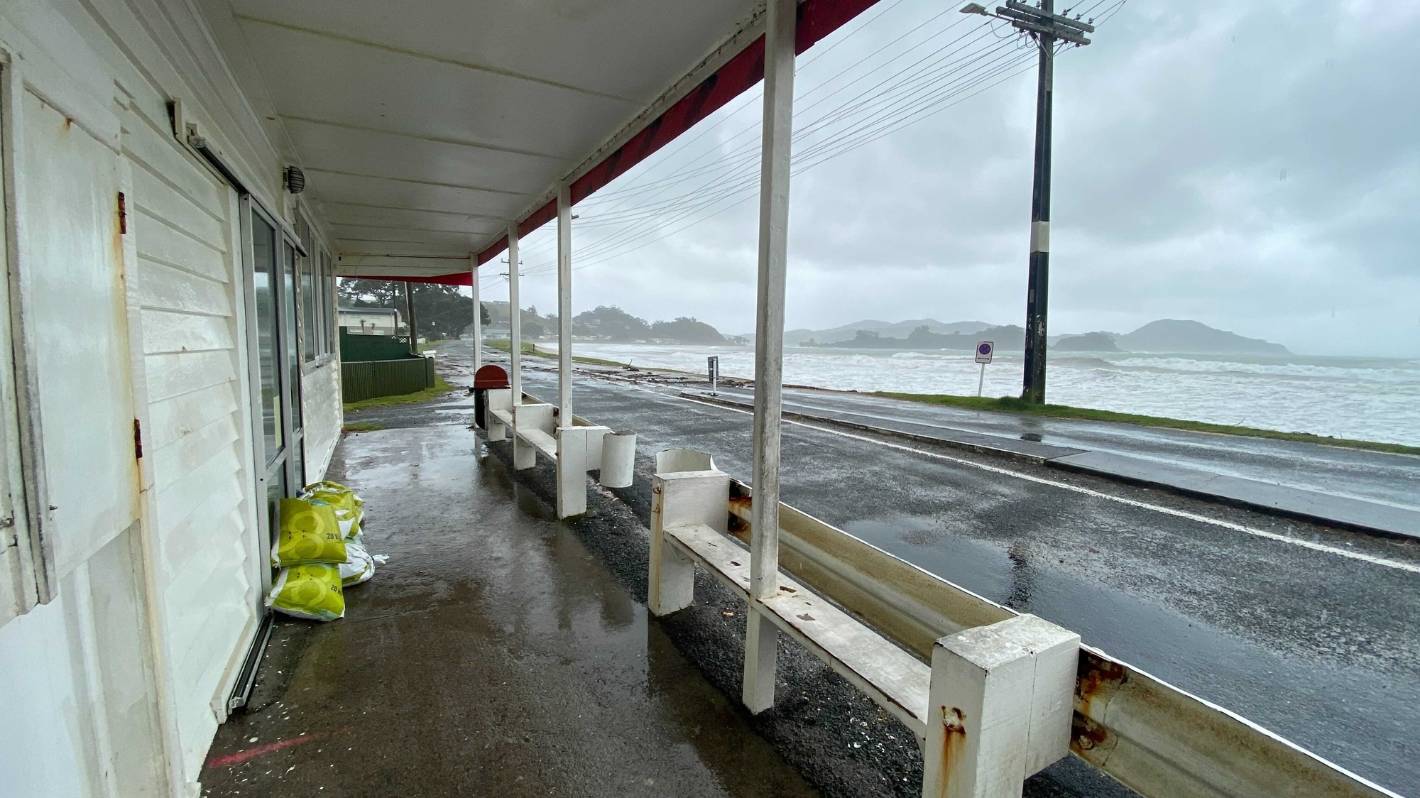A precautionary state of emergency has been declared for Northland, where a number of roads have been closed due to flooding and thousands are without power, as Cyclone Gabrielle bears down on the upper North Island.
Gale force winds have been recorded at many sites across the Northland region: 90km/h gusts at Kaitaia; 95km at Purerua, 80km at Kerikeri and Cape Reinga – a more exposed site – recorded a 140km gust.
The state of emergency was declared at 4.30pm on Sunday, for an initial period of seven days.
Have you been affected by the weather in Northland? Email aucklandnewsroom@stuff.co.nz
An emergency mobile alert advising of the declaration was being sent to phones (with the capacity to receive these) in Northland.
READ MORE:
* Auckland Harbour Bridge shut due to severe wind gusts as Cyclone Gabrielle moves in
* ‘This one has us worried’: New Zealand prepares for Cyclone Gabrielle
* Here’s what we know about Cyclone Gabrielle’s expected landfall
MetService has issued a red heavy rain warning for the Northland region covering the 36-hour period from noon on Sunday to midnight on Monday, forecasting up to 200-300mm of rain south of about Kaeo, and 100-180mm elsewhere over this period.
There is a strong (red) wind warning valid from noon Sunday to 9pm Tuesday, with MetService forecasting severe gales reaching 120-130km or “possibly higher” from Monday, depending on how Cyclone Gabrielle is tracking.
DENISE PIPER/Stuff
Water came over the road at Oakura, northeast of Whangārei at high tide as local shops closed.
MetService meteorologist Mmathapelo Makgabutlane said there had been upwards of 40 to 100mm of rain across the Northland region since 12am on Sunday.
Up to 4.30pm, the Whangārei Airport weather station recorded 93mm of rain since midnight; 65mm at Kaihohe; 50mm in Kerikeri, and 38mm at Cape Reinga.
Makgabutlane said they are expecting big rainfall accumulations associated with the weather event across the country, with the heaviest rain – and the bulk of the rain – due to hit on Monday.
Fire and Emergency communication centres national manager Gavin Travers said crews responded to 31 weather-related calls between 6am and 4pm on Sunday – most were in Northland, but the number of calls from Auckland and Coromandel Peninsula have started to increase.
WHANGAREI DISTRICT COUNCIL
Flooding and fallen trees have caused roads to close in Whangārei on Sunday, as Cyclone Gabrielle tracks closer to New Zealand.
Power outages
At 5pm on Sunday, at least 15,000 households across Northland were without power – 5123 Northpower users (covering Whangārei and Kaipara districts) and 10,309 Top Energy users, in the Far North.
Households in the Donnellys Crossing, Tutukaka and Hakaru areas were also without power, however Northpower wasn’t able to produce data on how many customers were affected.
Roads closed, water pressure issues
Whangārei District Council has advised people may notice reduced water pressure due to power outages, and urged people to fill some large bottles as an emergency supply if they haven’t already.
Top Energy/Supplied
More than 15,000 households are without power as Cyclone Gabrielle tracks towards Aotearoa.
As of 4pm, five roads have been closed in Whangārei due to flooding and fallen trees, and a further 11 were impacted by the extreme weather event, but passable with caution, the council advised.
Rubbish collection in Whangārei was on hold until further notice, and rural transfer stations were closed until Tuesday, it advised.
Civil Defence Northland is advising people to delay any unnecessary travel if possible.
As of 4.30pm, Access Road and Neems Road had been closed due to fallen trees, Kaipara District Council advised. Glinks Rd was down to one lane due to a fallen tree.
Civil Defence Centre opens
A Civil Defence Centre has opened at McKay Stadium Kensington in Whangārei for people who need to leave their homes, Civil Defence Northland says.
People are advised to stay with friends and family where possible if their home becomes too dangerous to stay in. If you have nowhere else to go, go to 97 Western Hills Drive, where they can arrange basic accommodation.
The whole of the North Island is on a severe weather warning for strong wind – with Northland, Coromandel, Auckland including Great Barrier Island on the highest wind alert.
Lisa Murray Head of Weather Communications said: “I can’t remember a time when the whole of the North Island was on a wind warning. This is a huge sprawling weather system affecting the country.”




